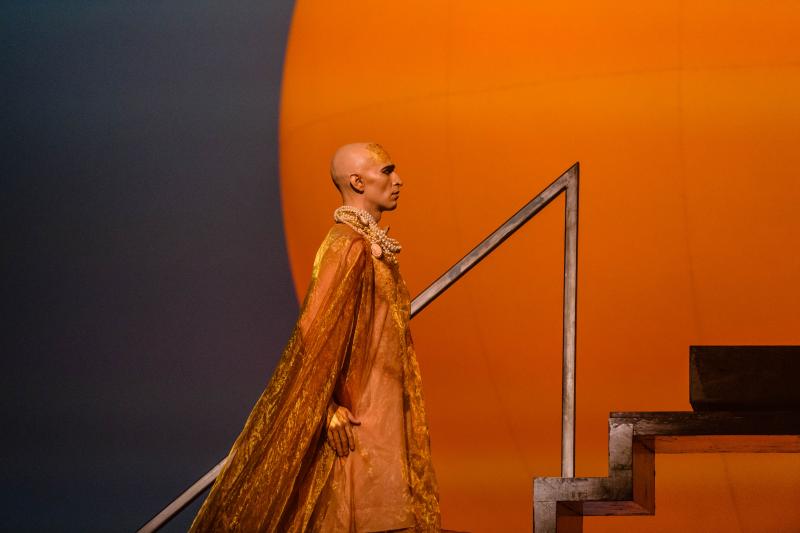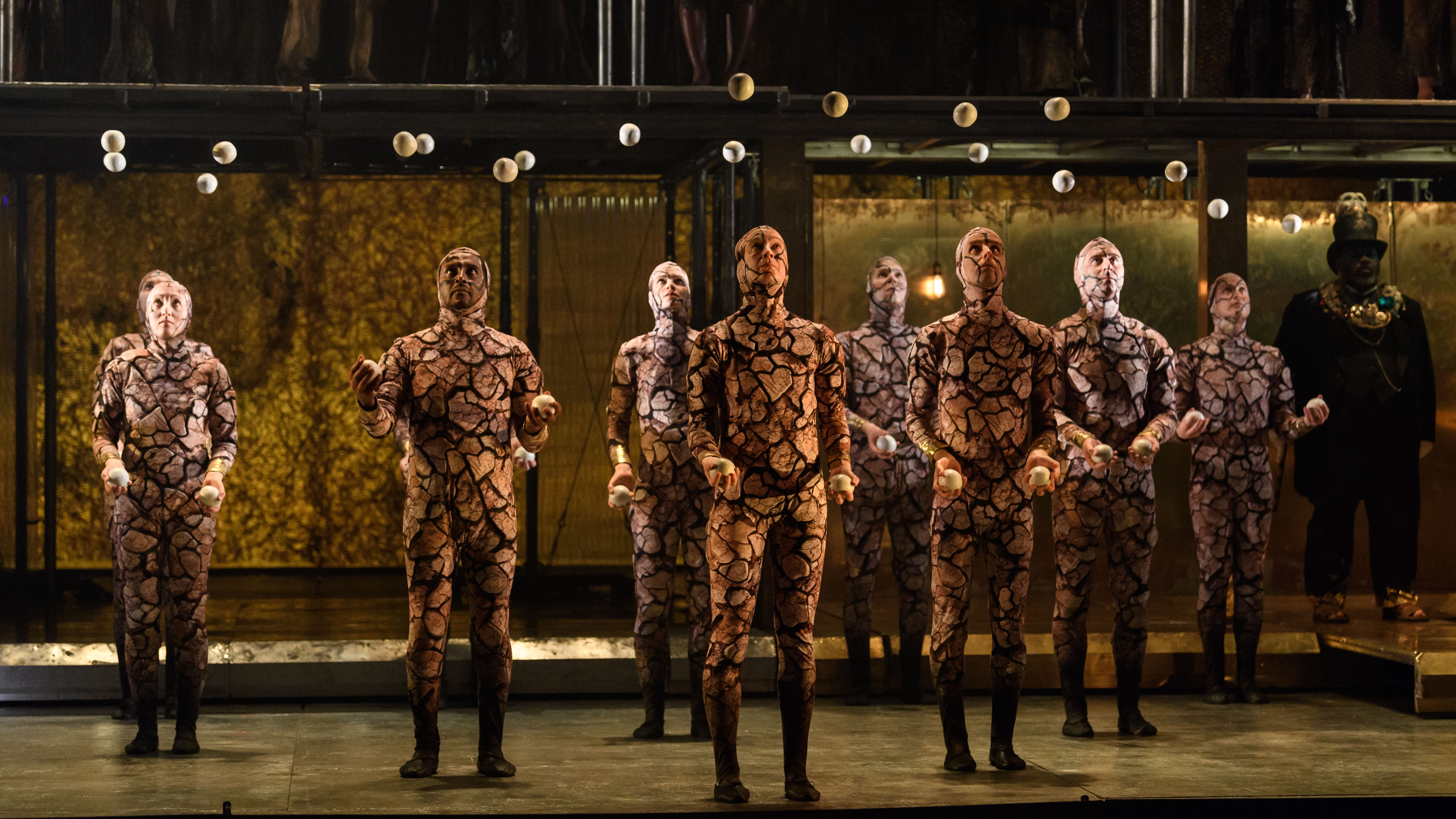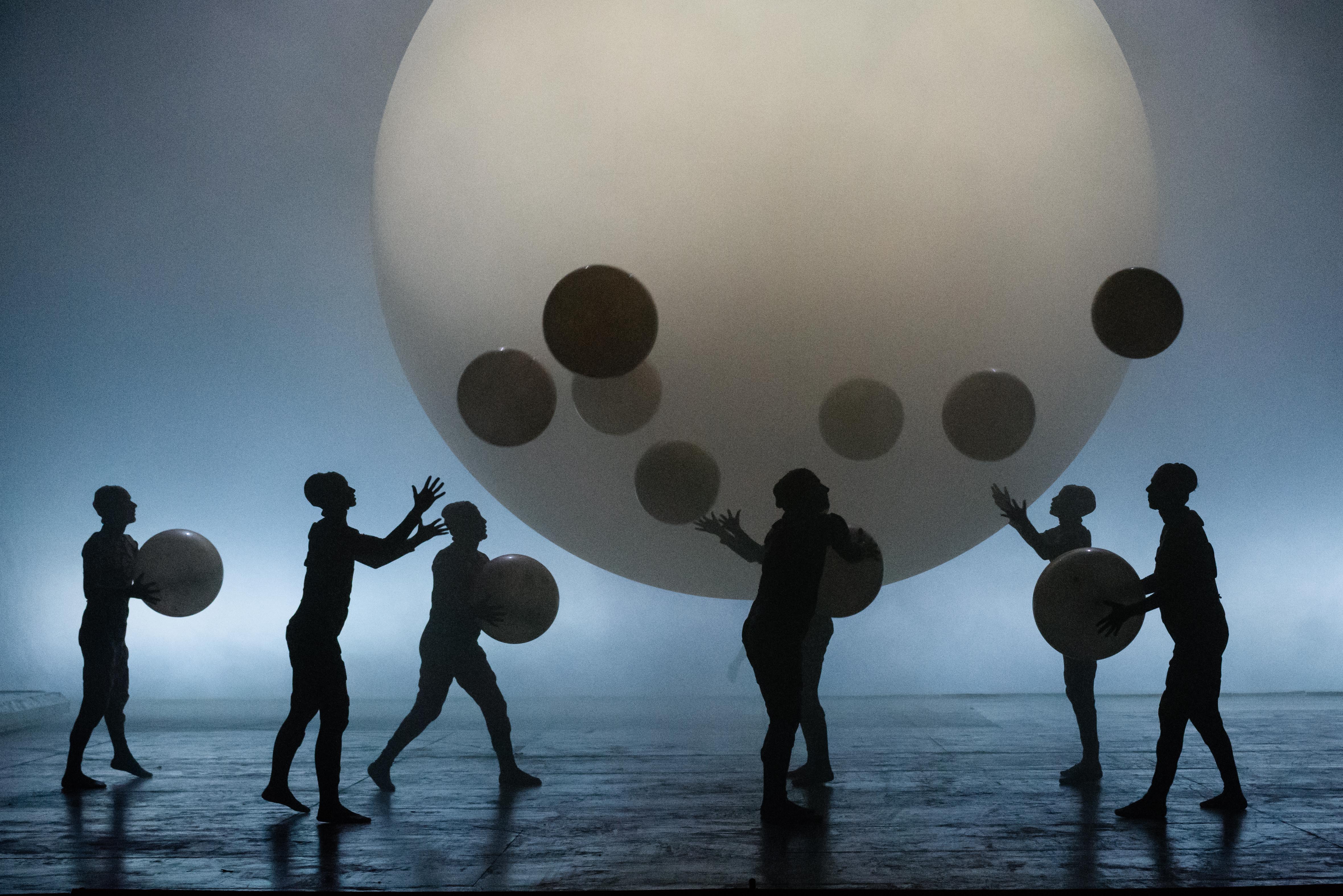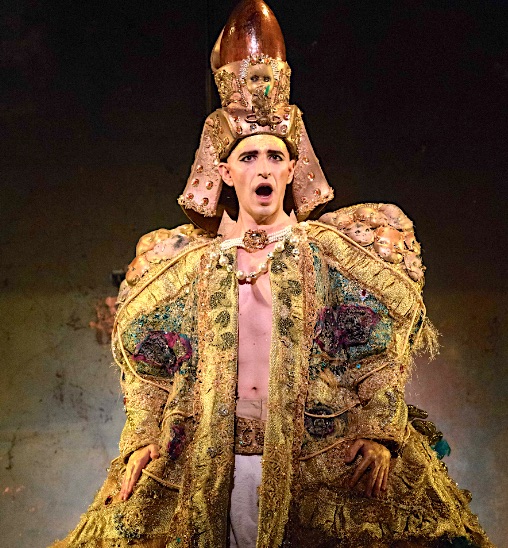Akhnaten, English National Opera review - still a mesmerising spectacle | reviews, news & interviews
Akhnaten, English National Opera review - still a mesmerising spectacle
Akhnaten, English National Opera review - still a mesmerising spectacle
ENO's most successful contemporary opera ever makes a triumphant return

You start off fighting it. Those arpeggios, the insistent reduction, simplification, repetition, the amplification of the smallest gesture into an epic. Then something happens. Somewhere among the slow-phase patterns pulsing on ear and eye, you surrender to Glass-time and the hypnosis is complete.
Akhnaten is opera as therapy, as cocoon, as mindfulness exercise, clean as Marie Kondo’s living room and every bit as consoling. When you reduce your musical possessions to the barest minimum (hell, even the violins get jettisoned in this deliciously grainy score, along with the surtitles) you throw all focus on those that remain. Do they spark joy? In Phelim McDermott’s sell-out 2016 production, revived here for the first time, they do. Up to a point. Everything is ritualised and reduced in a staging with more than a hint of Robert Wilson about it. Layers of movement are gradually built up – visual ostinatos that overlap and intersect with intricate interest and precision. This third panel in Glass’s triptych of “Portrait” operas has no more interest in narrative than its companions, and this soft-focus meditation on all things Egyptian is well served by a production that fuses music and movement into a gorgeous ceremonial spectacle.
Everything is ritualised and reduced in a staging with more than a hint of Robert Wilson about it. Layers of movement are gradually built up – visual ostinatos that overlap and intersect with intricate interest and precision. This third panel in Glass’s triptych of “Portrait” operas has no more interest in narrative than its companions, and this soft-focus meditation on all things Egyptian is well served by a production that fuses music and movement into a gorgeous ceremonial spectacle.
Perhaps all this abstraction is a statement about faith? Akhnaten’s conversion to monotheism finds expression in the balls, spheres, globes and orbs that gradually come to dominate the stage, edging out the many Gods who enter like a living frieze at the start, and climaxing in a giant sun that gradually flushes red in one of the most striking images in an evening full of memorable stage pictures. A love-scene between Akhnaten and Nefertiti sees the couple slowly weaving themselves up into a single fleshy skein while singing music that always finds its way back to promiscuous unison; a battle rages around the still figure of Akhnaten, juggling clubs flying overhead like arrows; the newly-crowned Pharoah, a human pupa, is stripped naked before being meticulously dressed in his embroidered chrysalis of a robe. It’s heady stuff, and technically supreme. The skills ensemble from Gandini Juggling are magicians with their hands and bodies, but no more perhaps than ENO’s orchestra, who bend and undulate their way through Glass’s Escher-like arpeggios with no less precision under conductor Karen Kamensek. ENO’s chorus add their might to choruses that flood the ear with sudden richness after the lean beauty of the solo passages. But there’s no getting away from the sense of circus. Every marvel, every gasp or doubt breaks the larger spell of the opera, dragging it closer to Cirque du Soleil spectacle.
It’s heady stuff, and technically supreme. The skills ensemble from Gandini Juggling are magicians with their hands and bodies, but no more perhaps than ENO’s orchestra, who bend and undulate their way through Glass’s Escher-like arpeggios with no less precision under conductor Karen Kamensek. ENO’s chorus add their might to choruses that flood the ear with sudden richness after the lean beauty of the solo passages. But there’s no getting away from the sense of circus. Every marvel, every gasp or doubt breaks the larger spell of the opera, dragging it closer to Cirque du Soleil spectacle.
 American countertenor Anthony Roth Costanzo (pictured right), impossibly androgynous, returns in the title role. The voice has grown in power since 2016, projecting with merciless intensity over the orchestra, and still with an uncomfortable tick of settling south of a note before rolling up to pitch. But singing quietly, with no pressure on the voice, he’s mesmerising, and his "Hymn to the Sun" is beautifully handled. Soprano Rebecca Bottone also returns as his mother Queen Tye, with mezzo Katie Stevenson a welcome addition as a Nefertiti. Keel Watson adds craggy warmth to the bottom of the ensemble as Aye, a foil to Colin Judson’s ringing High Priest.
American countertenor Anthony Roth Costanzo (pictured right), impossibly androgynous, returns in the title role. The voice has grown in power since 2016, projecting with merciless intensity over the orchestra, and still with an uncomfortable tick of settling south of a note before rolling up to pitch. But singing quietly, with no pressure on the voice, he’s mesmerising, and his "Hymn to the Sun" is beautifully handled. Soprano Rebecca Bottone also returns as his mother Queen Tye, with mezzo Katie Stevenson a welcome addition as a Nefertiti. Keel Watson adds craggy warmth to the bottom of the ensemble as Aye, a foil to Colin Judson’s ringing High Priest.
Spoken interventions still feel gauche and unnecessary, and an extended dramatic coda jumping forward to the present day is unnecessary. But there’s no denying the strange magic of both piece and production. Philip Glass’s pharaoh may have no clothes, but he has never needed them less.
The future of Arts Journalism
You can stop theartsdesk.com closing!
We urgently need financing to survive. Our fundraising drive has thus far raised £49,000 but we need to reach £100,000 or we will be forced to close. Please contribute here: https://gofund.me/c3f6033d
And if you can forward this information to anyone who might assist, we’d be grateful.

Subscribe to theartsdesk.com
Thank you for continuing to read our work on theartsdesk.com. For unlimited access to every article in its entirety, including our archive of more than 15,000 pieces, we're asking for £5 per month or £40 per year. We feel it's a very good deal, and hope you do too.
To take a subscription now simply click here.
And if you're looking for that extra gift for a friend or family member, why not treat them to a theartsdesk.com gift subscription?
more Opera
 Tosca, Welsh National Opera review - a great company reduced to brilliance
The old warhorse made special by the basics
Tosca, Welsh National Opera review - a great company reduced to brilliance
The old warhorse made special by the basics
 BBC Proms: The Marriage of Figaro, Glyndebourne Festival review - merriment and menace
Strong Proms transfer for a robust and affecting show
BBC Proms: The Marriage of Figaro, Glyndebourne Festival review - merriment and menace
Strong Proms transfer for a robust and affecting show
 BBC Proms: Suor Angelica, LSO, Pappano review - earthly passion, heavenly grief
A Sister to remember blesses Puccini's convent tragedy
BBC Proms: Suor Angelica, LSO, Pappano review - earthly passion, heavenly grief
A Sister to remember blesses Puccini's convent tragedy
 Orpheus and Eurydice, Opera Queensland/SCO, Edinburgh International Festival 2025 review - dazzling, but distracting
Eye-popping acrobatics don’t always assist in Gluck’s quest for operatic truth
Orpheus and Eurydice, Opera Queensland/SCO, Edinburgh International Festival 2025 review - dazzling, but distracting
Eye-popping acrobatics don’t always assist in Gluck’s quest for operatic truth
 MARS, Irish National Opera review - silly space oddity with fun stretches
Cast, orchestra and production give Jennifer Walshe’s bold collage their all
MARS, Irish National Opera review - silly space oddity with fun stretches
Cast, orchestra and production give Jennifer Walshe’s bold collage their all
 Káťa Kabanová, Glyndebourne review - emotional concentration in a salle modulable
Janáček superbly done through or in spite of the symbolism
Káťa Kabanová, Glyndebourne review - emotional concentration in a salle modulable
Janáček superbly done through or in spite of the symbolism
 Buxton International Festival 2025 review - a lavish offering of smaller-scale work
Allison Cook stands out in a fascinating integrated double bill of Bernstein and Poulenc
Buxton International Festival 2025 review - a lavish offering of smaller-scale work
Allison Cook stands out in a fascinating integrated double bill of Bernstein and Poulenc
 Tosca, Clonter Opera review - beauty and integrity in miniature
Happy surprises and a convincing interpretation of Puccini for today
Tosca, Clonter Opera review - beauty and integrity in miniature
Happy surprises and a convincing interpretation of Puccini for today
 Hamlet, Buxton International Festival review - how to re-imagine re-imagined Shakespeare
Music comes first in very 19th century, very Romantic, very French operatic creation
Hamlet, Buxton International Festival review - how to re-imagine re-imagined Shakespeare
Music comes first in very 19th century, very Romantic, very French operatic creation
 Falstaff, Glyndebourne review - knockabout and nostalgia in postwar Windsor
A fat knight to remember, and snappy stagecraft, overcome some tedious waits
Falstaff, Glyndebourne review - knockabout and nostalgia in postwar Windsor
A fat knight to remember, and snappy stagecraft, overcome some tedious waits
 Salome, LSO, Pappano, Barbican review - a partnership in a million
Asmik Grigorian is vocal perfection in league with a great conductor and orchestra
Salome, LSO, Pappano, Barbican review - a partnership in a million
Asmik Grigorian is vocal perfection in league with a great conductor and orchestra
 Semele, Royal Opera review - unholy smoke
Style comes and goes in a justifiably dark treatment of Handelian myth
Semele, Royal Opera review - unholy smoke
Style comes and goes in a justifiably dark treatment of Handelian myth

Comments
On what grounds is Akhnaten